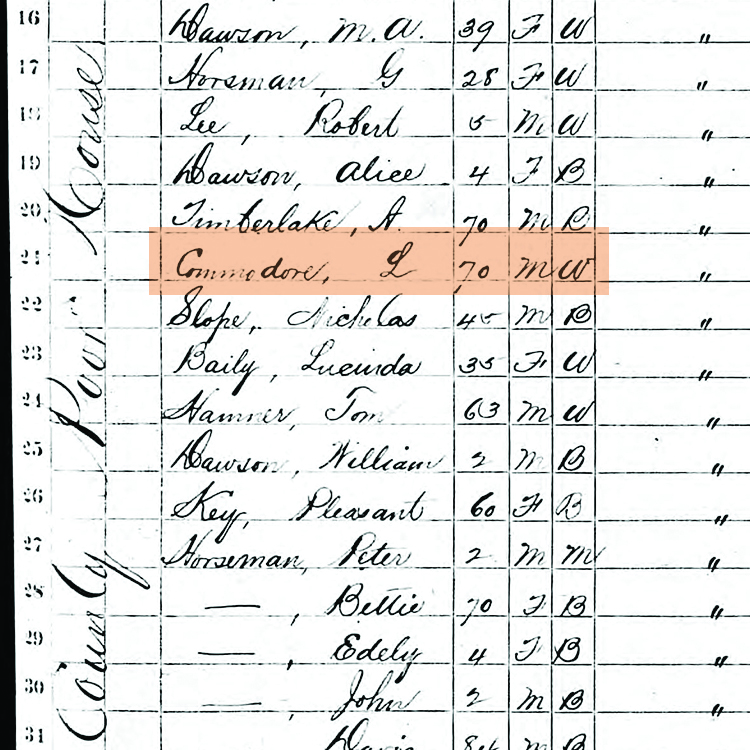While the University leased many enslaved workers, Lewis Commodore was the only person known to have been purchased and enslaved by the University in the institution’s history. He was working as the Rotunda bell ringer and janitor when the Dabney Minor estate, to which he belonged, went up for auction in 1832. A cohort of University faculty, including Law Professor John A.G. Davis, purchased his bondage for $580 and were reimbursed by the Board of Visitors.
Lewis Commodore was born into slavery in 1803 at Gale Hill, the Minor family’s plantation in Albemarle County.[1] Although family head James Minor died in 1791, the enslaved people of the Minor estate were not divided until 1806 when Commodore was three.[2] Commodore, his parents Harry and Mary, and his siblings then became the property of David Yancey and his wife Anne Minor, one of James Minor’s daughters.[3] However, Anne and David died in 1806 and 1807, respectively.[4] In 1808, Anne’s brother Dabney Minor purchased portions of their father’s estate, and in 1812 he took full possession of Gale Hill, which included its enslaved workers.[5]
Records do not indicate the nature of Commodore’s work while he was enslaved at Gale Hill. In 1824, Dabney Minor moved Commodore to another plantation, Carrsbrook, where he worked as a house servant. When Minor’s estate was divided following his death in 1824, Commodore was separated from his parents and siblings. It is unclear who enslaved him during this period, but he was likely rented out by the estate’s executor for six years.[6]
University Bursar Alexander Garrett became the Carrsbrook’s executor in 1831, at which point he rented Commodore to the University of Virginia. Commodore lived and worked in the Rotunda as the bell ringer and its janitor. He rang the bell at dawn, during passing time between classes, and to mark special occasions. In his role as janitor, Commodore was charged with keeping the Rotunda library, classrooms, and chemical laboratory clean and heated. When school was not in session, Commodore was sent to work outside the Rotunda, often to clean privies.[7] Commodore served the local Black community as a minister.[8]
According to UVA alumnus Edward Alfred Pollard’s 1859 recollections, Commodore “acquired a smart, practical knowledge of chemistry” and was “also something of a classical scholar” due to his immersion in college life. Edward also remarked that Commodore frequently asked Northern students about “the free country” and “the condition of his black brethren in the North.”[9]
The remains of the Dabney Minor estate were put up for sale in Charlottesville in 1832. Noting his contributions to the University community, Law Professor John A.G. Davis, Faculty Chairman Robert M. Patterson, and Proctor John A. Carr purchased Commodore's bondage for $580 at auction. A few months later, the Board of Visitors reimbursed the three faculty members and Commodore officially became University property.[10] Lewis Commodore was the only person known to have been enslaved directly by the University in the institution’s history (UVA otherwise leased many enslaved workers).[11]
On April 16, 1867, Commodore moved into the Albemarle County Poor House on land belonging to the Duke family, situated on what is now UVA's North Grounds. As of 1868, Commodore was still at the Poor House and in ill health, suffering from a “rupture.” He remained at the Poor House for the rest of his life, even as the Poor House moved to Keswick in 1870. Commodore died on March 2, 1872 and is likely buried in the Keswick Poor House cemetery.[12]
Sources
[1] President’s Commission on the University and Slavery: Report to President Teresa A. Sullivan, The Rector and Visitors of the University of Virginia (2018), 31.
[2] Ibid.
[3] Ibid.
[4] Anne Yancey’s death was reported in the March 28, 1806 edition of the Enquirer, page 3, Richmond, Virginia. David Yancey suffered from a pulmonary disease shortly afterward, and traveled to Jamaica in a final attempt to alleviate his sickness by exposing himself to a different climate. The January 30, 1808 edition of the Enquirer, page 3, reported that he died in Jamaica.
[5] Commission Report, 32.
[6] Ibid.
[7] Ibid.
[8] Ibid., 33.
[9] Ibid.
[10] Ibid., 32.
[11] Ibid., 31.
[12] Ibid., 35.

